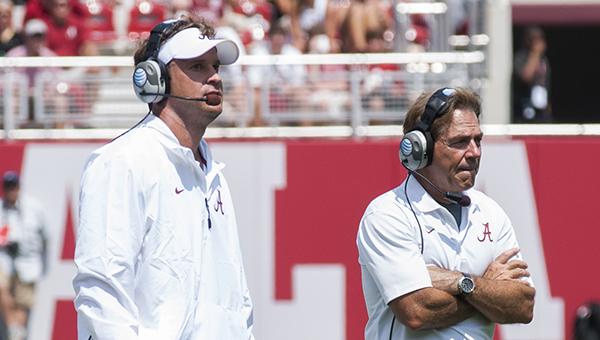When Alabama hired Lane Kiffin to take over as offensive coordinator, pearls were clutched in a then-unseen volume. Here was a botched head coach who left flaming mattresses in his wake after leaving Tennessee and who was fired at an airport terminal after his term at Southern California.
Now in his second year with the Crimson Tide, Kiffin has yielded two College Football Playoff-caliber offenses with two first-year starters at quarterback. As Kiffin puts it, his opportunity at Alabama has been a learning experience, one offered to him “when the phones weren’t ringing” and his reputation was toxic.
“I’d like to thank Coach Saban for the opportunity of coming back for a second year,” Kiffin said. “And you really — I really had no idea how much I would learn really in the second year. Now you really understand why there is no doubt he’s the best coach in college football and the process he puts together in understanding how everything goes. The best example to me is after the Ole Miss game as he refers to as, you know, ‘Everybody wrote us as dead and gone.’ And all he did is go back and work the next day just like he does every single day and not worry about anything else but worrying about getting these players better and the coaches better. So thanks.”
When Kiffin took over as coach at Tennessee, he was college football’s wunderkind, a prodigy who understood offense better than just about anybody. Unfortunately for him, being head coach of a power 5 involves more than on-field strategy, a truth Kiffin said Saban has helped him understand.
“Well, I think so little is known about Coach Saban, about what he does outside of what you see in the media, in the press conferences, or during the game,” Kiffin said. “I made a lot of mistakes which were focusing completely on football and just worried about football and the Xs and Os of it. And then you see what he does whether it’s taking time to meet with other sports recruits, the focus that he has towards the donors, towards academics, towards individual meetings with our kids when things are going on. Always on the phone with recruits or our own players’ families when there are issues coming up. He really is the CEO of the program, and the kids understand that process and what he’s about.”
Kiffin has seen his own growth and adjustment in his two years in Tuscaloosa, from a bit of a rocky start returning to assistant coaching and relearning his craft.
There was a transition. And I think that just becomes from — I don’t think that was anything about Coach Saban or myself. I think just being an assistant coach again, there’s a transition. You’re not the head coach and had been a head coach for a while at a couple different places. So just getting back into that and understanding that role,” Kiffin said. “That’s why I talked about the second year. I think it was very critical to come back for another year to continue to learn from him and understand how it all works and to see where last year was kind of smoother. This year had a little more adversity in it and more new guys playing and things happening throughout the year that he dealt with. You saw how he managed those.”
So for all his talk about his second year at Alabama, the question for Kiffin remains: will there be a third?
“I’d love to be back there,” Kiffin said. “I think we’ll have a new set of challenges with the third year of a new quarterback, a lot of great players, you know, replace the Heisman Trophy winner, just as we did a Biletnikoff winner the year before and then some great returning players to work with. I’d be really excited about that.”









